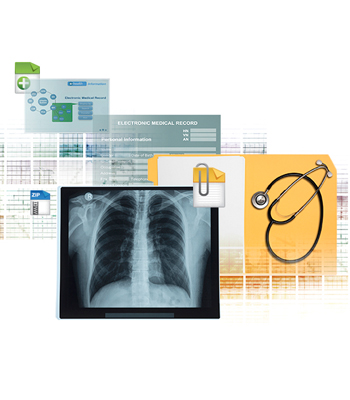Healthcare is a dynamic industry, and the pace of change relative to regulation, reimbursement and technology is rapid. The topic of interoperability – the ability to exchange patient information between disparate systems such as a doctor’s office, a hospital and a rehabilitation center – has been top of mind over the past couple of years. 
This program gives financial incentives to eligible health-care providers for the “Meaningful Use” of certified electronic health record technology for patient information, including interoperability.
But, interoperability mandates have created challenges. Healthcare organizations must now connect disparate systems in an efficient and affordable way, and that can be difficult to achieve. For instance, a doctor’s office must be able to share Patient A’s records with the hospital during surgery and then both must be able to share records with the rehabilitation center. An estimated 30%-40% of a patient’s medical records exist on paper (or digital equivalents) and the typical way that information is exchanged is via fax. However, fax is neither secure nor efficient, and it certainly does not satisfy any Meaningful Use standards. So, what is the alternative?
Direct Messaging, the standard developed for the secure exchange of patient data, is one answer. Virtually any certified electronic health record technology is capable of sending a secure message. Portals have been used with varying levels of success in sharing documents across the community of care, from doctor to hospital and beyond. The primary roadblock, however, remains the under-served community of providers, such as long-term care, home health, therapies and small ambulatory providers, with limited or no EHR. These caregivers have limited capability to receive Direct Messages, and little to no ability to send them. This presents a significant challenge to hospitals trying to meet Meaningful Use Stage 2 interoperability requirements. These requirements mandate that 10% of the records for hospital patients who need transitional aftercare, such as rehabilitation or therapy, must be able to be sent electronically. These transactions are dependent upon hospitals being able to meet their requirements.
Through an exclusive integration with the Inofile Kno2 solution on our bizhub MFPs, we can offer any healthcare provider, large or small, the ability to leverage Direct Messaging. Kno2 offers health-care providers the ability to scan a document, such as a referral or advanced directive, on the bizhub and then securely transmit that document across a national clinical exchange network. This ability bridges the interoperability gap. In addition, we provide healthcare organizations with access to the Kno2 cloud application, which enables them to receive direct messages from their referral partners. The benefits of this technology and integration are many: connecting the entire community of care; assisting facilities covered by the Meaningful Use program to meet their requirements; increasing the security of patient data exchange to enhance HIPAA compliance; and minimizing the challenges associated with fax transmission, such as incomplete, delayed or garbled transmission.
Our goal is to connect the community of care. Discover what Konica Minolta can do for your organization – connect with us on Twitter via #HIMSS15 and #KMHealth.
Where we’ll be …
April 12-15: HIMSS Conference, Chicago. Join us and Inofile™ at the Interoperability Showcase, where we will demonstrate our unique collaboration to send Direct Messages from our Direct-Enabled/Surescripts-Validated MFPs. And, stop by Booth #3977 for educational talks by HIPAA and security expert Ali Pabrai, CEO of ecfirst/HIPPA Academy.
May 17-20: Amerinet National Meeting, Orlando, Fla.